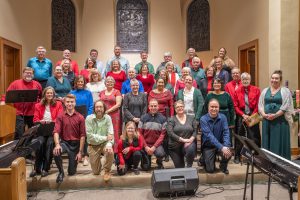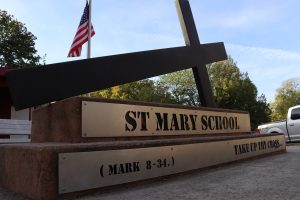
Bible Group Reading Together
By Wendy Royston
At the Lord’s nudging, Bishop Donald DeGrood has laid out a vision for a diocesan-wide call to, essentially, embody the true meaning of Catholicism.
“Missionary discipleship is following Jesus and sharing Him with those around you,” explained Dr. Chris Burgwald, director of Adult Discipleship and Evangelization. “To be Catholic has always meant to have a relationship with God, and then do what I can to help others to have a relationship with God. … This is kind of putting a specific name to what our Catholic faith has always been about.”
In his first year as the shepherd of the Sioux Falls diocese, Bishop DeGrood has sensed a need for renewed emphasis on what he has themed Lifelong Catholic Missionary Discipleship Through God’s Love. As it is likely this dedication will remain the same for longer than 2021, diocesan staff are committed to helping Catholics understand the mission early this year.
“At the end of Matthew’s Gospel, Jesus said, ‘Go make disciples of all nations, baptizing them in the name of the Father, Son and Holy Spirit, teaching them to observe all that I have commanded you. Know I am with you always until the end of the age.’ So, Jesus told us, as members of the Church … that we’re all called to make disciples based on our state in life, to the degree that we’re able, our life circumstances, we’re all called to do this,” Burgwald explained. “A missionary disciple is somebody who follows Jesus Christ in a conscious, intentional way. They have a relationship with Jesus—that’s the discipleship side—and as a missionary disciple, he or she seeks to share Jesus with others as well.”
Though becoming a missionary disciple may sound like a grand undertaking, Burgwald said it really is a natural part of the process we are called to in loving God and our neighbors.
“To be a missionary disciple does not require a degree in theology, nor a minimum number of years on this earth. It really is just about a depth of faith. When you’re a mature disciple, you naturally start to tell other people about your faith. You can’t help it,” he said. “It’s like when you go to a new restaurant that you love. What do you do? You tell people about it. You go to a movie that you love, and what do you do? You tell people about it. You meet Jesus Christ in a profound way, and what do you do? You tell somebody else about it.”
The first step in missionary discipleship, according to Burgwald, is for Catholics to work on their own relationships with God.
“We talk about this, really, in a holistic way,” he said. “It’s about prayer, but not just about prayer. It’s about knowing the Bible and Church teaching, but not just about the Bible and Church teaching. It’s about growing in virtue and my ability to relate to other people, but not just that. It’s about walking with others closer to Jesus, but not just that.”
Those focuses help the individual mature in the four key areas of discipleship formation: spiritual, intellectual, human and apostolic. And, as one digs into learning to pray, learning what the Bible says and digging into Church teaching, they’ll naturally thirst for more and their discipleship will evolve.
Growing with small groups

To continue their faith journeys, many disciples turn to others. Burgwald says small groups are a great way to grow as missionary disciples. Although missionary discipleship has always been the tenet of the Catholic faith, it isn’t always something that just happens on its own.
“There are a lot of Catholics who desire to grow in their faith, but they’re not yet in a place where they know how to share with those around them,” Burgwald said.
That’s where parish and diocesan staff come into play. With a vast array of resources and the wisdom of priests and the bishop, those individuals can accompany others in their journey to the next level of faith formation.
Much of the time, small group Bible or faith studies originate at the parish level.
“When you’re together on some regular basis, whether it’s weekly or every couple of weeks or maybe monthly, with a small group of peers who are all trying to grow in your faith, there’s this ‘we’re in this together’ kind of thing that happens,” Burgwald said. “The accountability, the relationships, the bonding that happens is a really powerful way—a very fruitful way—for people to grow as missionary disciples. Nobody does it alone. … To hear how other people are growing in their faith is, oftentimes, a great way that I can grow in my faith, too.”
Often, small groups start at the urging of parish priests or directors of religious education, but sometimes they happen without formal ties to the parish.
“You want to do this with Father’s blessing, even in this situation,” he said, but “It doesn’t need to be anybody who has been formally involved in any religious programs of the parish.”
Other times, they are the result of diocesan programming, such as retreats like the Women’s Conference or Discipleship Day. As part of the new push for missionary discipleship, however, the Sioux Falls diocese is instituting more formal, in-depth programming.
Small groups already exist
Burgwald leads the three-year Equip program, which focuses on helping adults grow in prayer and learn Church teaching and Scripture, but also teaches skills about relating one’s own life, as well as Jesus’s, to others.
The program involves quarterly days of formation, monthly virtual meetings and regular contact with Burgwald. The program is selective in its participation; a recommendation is needed from a diocesan priest, and applicants are interviewed by Burgwald prior to entry into the program.
This year, Bishop DeGrood welcomed a National Evangelization Team, or NET Team, of college-aged Catholics from the Minneapolis/St. Paul archdiocese to work with teens and adults across eastern South Dakota. The team is working in various parishes in the diocese, sharing the good news of Jesus and offering opportunities to experience Him through retreats, fun nights, discipleship groups, praise and worship.
“The role we play is being an engaging presence on the front line. We are striving to build relationships and find people where they are at, both in their parishes and in homes,” representatives of the team wrote. “We are striving also to empower and give the adults in the community the tools they need to be able to be leaders and guide the youth.”
Burgwald said that the work of the Office of Discipleship and Evangelization closely ties to the formation of missionary disciples on a regular basis.
“Many of the diocesan events, especially in our office, are about providing opportunities for people to grow as missionary disciples,” he said, adding that it isn’t about telling people how to be Christians, but rather showing them. “All the different ways that we see Jesus (accompanying others) in the Gospels, we’re called to do that with the people who we interact with or we encounter on a daily basis. … That’s the way the vast majority of us can and should be living as missionary disciples—by just being a bright beacon in the lives of those around us.”
Meet people where they are
An easy, modern day way to get started on the road to evangelization is for a Christian to simply say a prayer for each person they encounter in a day, whether they know them or not.
 “Most of them, you don’t know who they are, but your prayers for them are a real way to practice your missionary discipleship,” Burgwald said. “But there are also the people the Lord has put more clearly in our paths that he wants us to accompany as well. That can be, if nothing else, by our prayers and by the way we live our lives that should bear witness to our faith.”
“Most of them, you don’t know who they are, but your prayers for them are a real way to practice your missionary discipleship,” Burgwald said. “But there are also the people the Lord has put more clearly in our paths that he wants us to accompany as well. That can be, if nothing else, by our prayers and by the way we live our lives that should bear witness to our faith.”
The key to missionary discipleship is meeting people where they are and showing them the light of God’s face in the midst of whatever darkness they face.
“They might know very little about God and Jesus or what it means to be a Christian. So my job is, in the way that I talk to them and in the way that I talk about religion in general, just to help them see that religious people aren’t crazy or jerks or bigots, so that the next person the Lord puts in their life is able to have that more Jesus-centered conversation,” he said. “Maybe we are the ones who are tilling the soil for someone else to be able to plant the seed.”
And, other times, the Holy Spirit may demand more.
“Maybe we’re the one who has to plant the seed in the soil that’s already been tilled by somebody else,” Burgwald said. “With (one) person, maybe I’m called to listen, but with (another) person, maybe I’m called to speak.”
Interested in starting a small group but don’t know where to begin? Dr. Burgwald has created a series of videos to help you start and lead your own small group. Find the videos at our YouTube page and click on “Small Group How To’s.”


